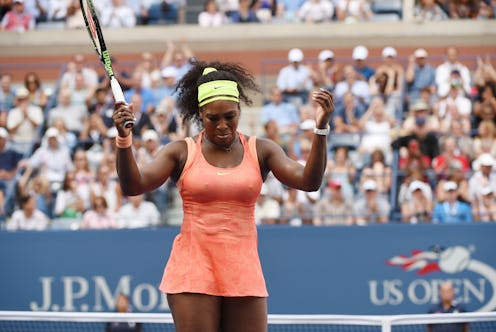Entertainment
Serena's Making Double History With The 'SI' Cover
Serena Williams is without a doubt the greatest athlete in the world, in my opinion, and she finally has a Sports Illustrated cover to shut the haters up. Williams, 34, is the 2015 Sports Illustrated Sportsperson Of The Year, and it's about damn time. It's another history-maker for the year for Williams, who won the Australian Open, the French Open and Wimbledon this summer. She's the first black female athlete to ever grace the cover as Sports Illustrated's Sportsperson Of The Year.
Williams was the obvious choice for the cover, in my mind, even though some SI fans are enraged that she beat out Pharoah, who is an actual horse, and that's all that needs to be said about that. Remarkably, she's the first woman to receive the award since Mary Decker, track world champion, won in 1983 — that's a whopping 32 years. And since the sports publication's debut in 1954, there have only been a total of ten women to take the honor. Not a good look for Sports Illustrated, which has been accused of sexism with their covers in the past.
And even more historic: Williams is the first black athlete to ever win the award. Since Billie Jean King took the honor for her own achievements in tennis in 1972, all ten women that have been Sportsperson Of The Year have been white. Luckily, though, Williams is not only an historic and deserving winner; it's also a symbolic choice, and SI makes note of not only her athletic prowess but her remarkable strength in the face of adversity and racism in the tennis arena, a kind of anti-blackness that could make anyone quit. SI notes that she came back to Indian Wells in 2015 after 14 years, after the crowds hurled racist slurs at her.
In an Instagram post, Williams was elated, of course, but her caption makes it clear that she knew that award had better go to her after such a banner year:
She knows it's been a long, long time coming for this type of recognition. And looking beyond that to the dismally low numbers of women that have received Sportsperson Of The Year is a frustrating and unfortunate caveat of Serena's issue. If the incontestable, greatest athlete in the world had to wait this long to get on the cover, what does that mean for other women in sports?
Hopefully Sports Illustrated is moving in a more progressive direction, and Serena could be a turning point. 2015: possibly the year the magazine starts to reflect the sexism and racism of the sports world, and how overcoming those obstacles makes minority, female athletes all the more deserving of the win.
